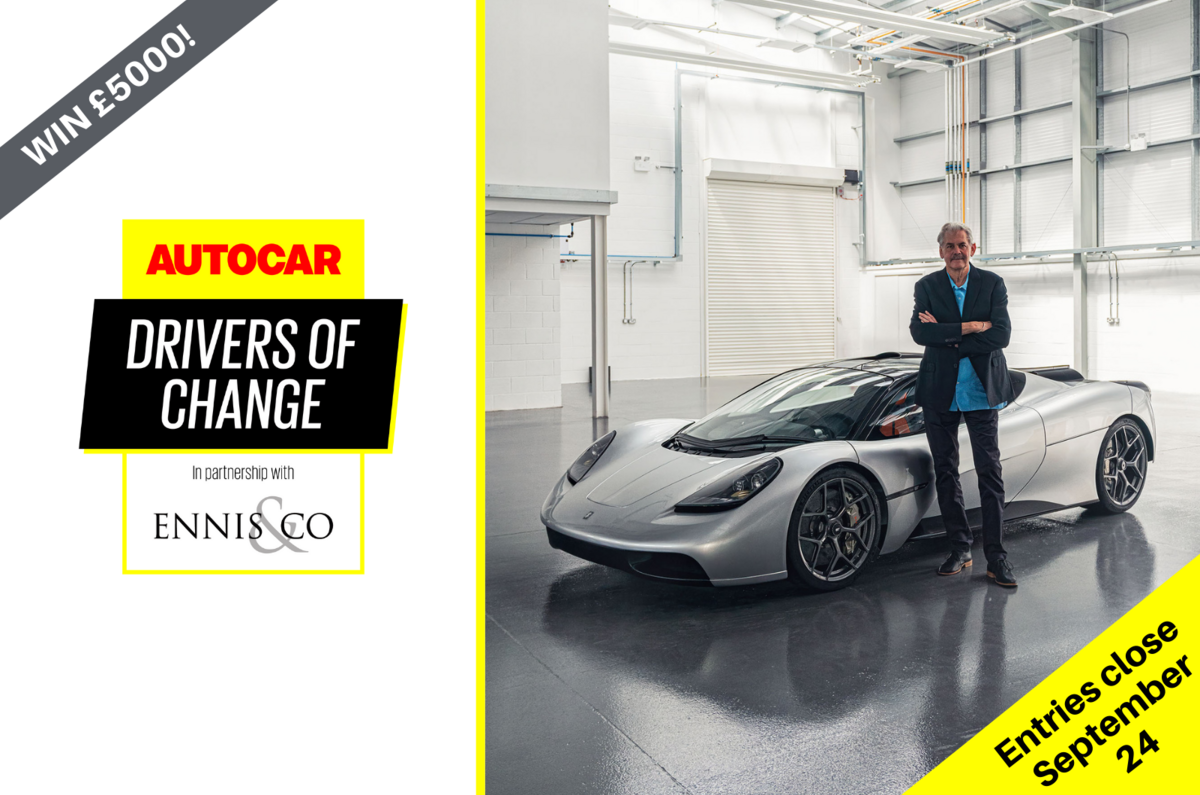Having been at the forefront of the automotive industry for the best part of five decades, Gordon Murray will provide an expert eye as one of the judges across the three categories that make up Drivers of Change: Technology, Digital and Retail.
We join him at his UK factory to find out more about what he’s looking for from this year’s entrants.
For a chance to win £5000, click here to enter the competition.
Why would you spend some of your extremely valuable time getting involved in a competition like this?
GM "Well, we always try to encourage new talent into the industry. But also, it's a bit more personal than that, because I got given a break back in 1970, with the Brabham Formula 1 team. And I've always been keen to encourage young talent back into the business. For example, in this company, we have apprenticeship schemes and we have graduate schemes. And we do very well at introducing very young talent into the car industry."
Why should people want to work in the automotive industry?
GM "I think the automotive industry right now is probably at its most exciting point. And I think it's a great time to join it at whatever level, actually, in whatever discipline, because the change we're going through - not just in design and powertrain, of course, but in the whole way we own cars, use cars, service cars - it's all changing. So the opportunities for people coming in right now are probably greater than they've ever been."
Do you think that the demand for talent is going to rise as we come out of Covid?
GM "Trying to find people for the business is something we find quite difficult at the moment, as we come out of Covid. We're growing at a massive rate. Here in the Gordon Murray group, we've gone from 108 people at the beginning of Covid to 204 as we stand today. We thought it would be quite easy but actually we've found it quite difficult to find people, which is once again why we try and encourage new talent. And we have training programmes to bring people along in, in the business."
Eventually, the people who enter this competition will have to stand up and make a presentation to you and the other judges. There must have been a time in your youth when you had to stand up and make a presentation to people who didn't necessarily know you. What was it like?
GM "It's something that you acquire the capability of as you do more. And as you grow in your own business, and you get more knowledge, you get much more comfortable with doing presentations or talks or lectures or whatever. But when I was relatively unknown at Brabham - I think I'd only been there two years, was a bit of a long-haired hippie - and I got invited to one of our top, top public schools to go and do a talk to the students. And I was terrified. I didn't know what to expect, thinking that I'd have to keep the talk at a fairly low level. I was absolutely amazed at the reception and the questions, plus how technical they were and how in depth they were. And that was sort of a baptism of fire for me. But after that you learn very quickly, the more you do."
You’re famous for good ideas that other people have never thought of. How do ideas come to you?
GM "I think it varies with people, with the personalities of people. I think you get two types of engineers: you get developers and you get innovators, and I think I fall into the second category. And then the ideas come to you pretty much out of the blue, literally the hot bath type of thing. But also, they come out of necessity. So in Formula 1, for example, you're staring at the regulations book all the time, and trying to find a way to have an unfair advantage and to be quicker and better. And I think that's where the innovation comes from.








Join the debate
Add your comment
Finally I made $92/hr. It’s time to take some action and you can join it too.It is a simple, dedicated and easy way to get rich. Three weeks from now you will wish you had started today. Simply give it a shot on the accompanying site.
GOOD LUCK… Cashoffer9.com